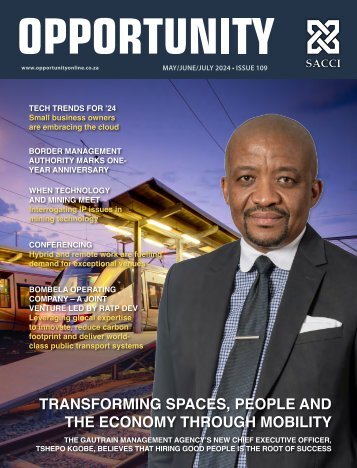Limpopo Business 2021-22
- Text
- Education
- Water
- Tourism
- Agriculture
- Business
- Investment
- Development
- Industrial
- Wwwglobalafricanetworkcom
- Programme
- Projects
- Infrastructure
- Province
- Mining
- Roads
- Economic
- Sector
- Provincial
- Limpopo
OVERVIEW Banking and
OVERVIEW Banking and financial services Banking services are more widely available than ever before. The SAB Foundation provides seed money for entrepreneurs. Credit: SAB Foundation Big strides have been made in providing banking services to the previously unbanked but there is still a long way to go. The widespread use of smartphones is creating new opportunities for banks and other financial service providers to further close the gap. A recent addition to the market is Standard Bank’s low-cost MyMo account. With free electronic transactions, unlimited card swipes and a low monthly fee, the MyMo account is ideal for lowincome earners, micro-entrepreneurs and the poor. Customers do not have to visit branches to sign up for the account. They can take a selfie on the mobile app. South African banking customers have a wider choice since Tyme Digital received a licence in 2017 to run a bank, the first time a new licence had been issued in decades. By early 2019, TymeBank was available in 500 Pick n Pay and Boxer stores and more than 50 000 customers had an account. Tyme stands for Take Your Money Everywhere; the bank does not have a branch network. African Rainbow Capital began as the venture’s BEE partner but in 2018 bought out the Commonwealth Bank of Australia. Tyme reported in October 2020 that it had 2.4-million customers, up from 1.4-million at the end of March. A 400% increase in the use of services such as airtime and electricity purchases was also noted. Second to market among the country’s new banks was Discovery Bank, which officially launched in 2019 and is experiencing rapid growth with retail deposits at the end of 2020 of R5.7-billion. SECTOR INSIGHT A recent addition to the market is Standard Bank’s low-cost MyMo account. Discovery Bank is applying the behavioural model it uses in its health business to reward good financial behaviour. The Discovery group is already a giant on the JSE with a market value of R83-billion and access to millions of customers. A mayor in the Vhembe District of Limpopo has been dismissed for his involvement in the scandal that brought down the VBS bank, a cooperative bank that was supposed to be run on very conservative principles. Municipalities were expressly forbidden from investing funds in an institution like VBS. VBS Mutual Bank was placed under curatorship in 2018. The appointed curator was not able to confirm all deposits. In the lead-up to the bank not being able to meet its commitments, municipalities had been making deposits to the bank although these violated restrictions put in place by the National Treasury. VBS began life as the Venda Building Society in 1982. The Public Investment Corporation held 34% of equity. Despite the bad experience with VBS, there is still interest in the mutual-bank model LIMPOPO BUSINESS 2021/22 54
OVERVIEW given the nature of the South African market. The Young Women in Business Network (YWBN) received approval in March 2021 for a mutual-bank licence. Savings and business loans will be offered, and the public will have a chance to buy shares later in the year. Bank Zero will also use the mutual model. South Africa’s four big retail banks (Nedbank, Absa, Standard Bank and First National Bank) have a solid presence in the major towns in the province. In May 2020, investment holding company PSG announced that it would reduce its holding in the rapidlygrowing Capitec Bank from 32% to 4%, earning about R4-billion by selling those shares. Agricultural value Agriculture is an important focus area for banks in Limpopo and so they have established specialised units which cover areas such as agronomy (grain, oil seeds, sugar and cotton), livestock (including game farming), horticulture and secondary agriculture which covers processing and storage. The Provincial Government of Limpopo is in the process of re-examining the agricultural sector to better use the value chain and to expand agro-processing in the province. One of the aspects under discussion is the model used in financing the sector and how partnerships are created. Related topics include land availability and access. The revitalised African Bank, which was put under curatorship in 2014 by the Reserve Bank, is making a play for new customers with an interesting offering that does not rely so much on digital wizardry as on presenting the customer with enhanced banking facilities. African Bank has created an account that allows up to five additional accounts to be created in the name of the main account. Fees are only charged for drawing cash or at the time of a transaction. There are no monthly fees for any of the accounts which can be either for saving or transactional. Each user has his or her own card and monies can be moved between accounts, ideal for families. The Limpopo Economic Development Agency (LEDA) intends establishing a local life insurance company. These initiatives aim to make banking more accessible for rural communities and to make finance more readily available to small and microsized businesses. Trying to integrate small business into the mainstream economy is a major goal of national and provincial governments in South Africa. To support entrepreneurial students, the University of Limpopo has set up the Limpopo Student Seed Fund together with the SAB Foundation. Support will be offered to businesses that promise to find solutions to social problems such as unemployment and hunger. Ubank is owned by a trust that is managed by the Chamber of Mines and the National Union of Mineworkers (NUM). It has about 100 branches and strong presence in Limpopo because of its strong focus on the mining sector. Ubank has about half-amillion clients. ■ ONLINE RESOURCES Financial Sector Conduct Authority: www.fsca.co.za National Credit Regulator: www.ncr.org.za Office of the Auditor-General of South Africa: www.agsa.co.za Public Investment Corporation: www.pic.gov.za South African Institute for Chartered Accountants: www.saica.co.za 55 LIMPOPO BUSINESS 2021/22
- Page 1 and 2:
LIMPOPO BUSINESS 2021/22 EDITION Th
- Page 3 and 4:
operate, and by making life better
- Page 5 and 6: PARTNER WITH STANDARD BANK FOR FRAN
- Page 7 and 8: It’s official. We’re honoured.
- Page 9 and 10: ange from manufacturing, agroproces
- Page 11 and 12: INTERVIEW Credit: RAL by the World
- Page 13 and 14: Providing quality and sustainable r
- Page 15 and 16: SPECIAL FEATURE The provincial gove
- Page 17 and 18: SPECIAL FEATURE Tourism Brandon Sto
- Page 19 and 20: SPECIAL FEATURE include integrated
- Page 21 and 22: TSHEPO SPECIALIST JEAN MAKER ABANTU
- Page 23 and 24: Thabane Thuso Maja Provincial Manag
- Page 25 and 26: FOCUS for our host communities. Thi
- Page 27: FROM SAVING MONEY TO SAVING LIVES E
- Page 30 and 31: OVERVIEW Agriculture A huge packhou
- Page 32: Credit: ZZ2 Lydenburg and Louis Tri
- Page 35 and 36: Driving growth in Limpopo Standard
- Page 38 and 39: FOCUS Bringing power to the communi
- Page 40 and 41: INTERVIEW PMC’s new COO is set to
- Page 42 and 43: OVERVIEW Energy Vivo is the site of
- Page 44 and 45: FOCUS Petroleum Agency South Africa
- Page 46 and 47: OVERVIEW Water Funding for the next
- Page 48 and 49: OVERVIEW ICT The Limpopo Broadband
- Page 50 and 51: FOCUS MTN drives digital growth and
- Page 52 and 53: OVERVIEW Transport and logistics Re
- Page 54 and 55: OVERVIEW The consultant on both pro
- Page 58 and 59: OVERVIEW Development finance and SM
- Page 60 and 61: FOCUS Partnership helps small busin
- Page 62 and 63: OVERVIEW Education and training De
- Page 64 and 65: FOCUS De Beers Group donates laptop
- Page 66 and 67: INDEX INDEX De Beers Group of Compa
- Page 68: VENETIA UNDERGROUND PROJECT The fut
Inappropriate
Loading...
Mail this publication
Loading...
Embed
Loading...























































































































































